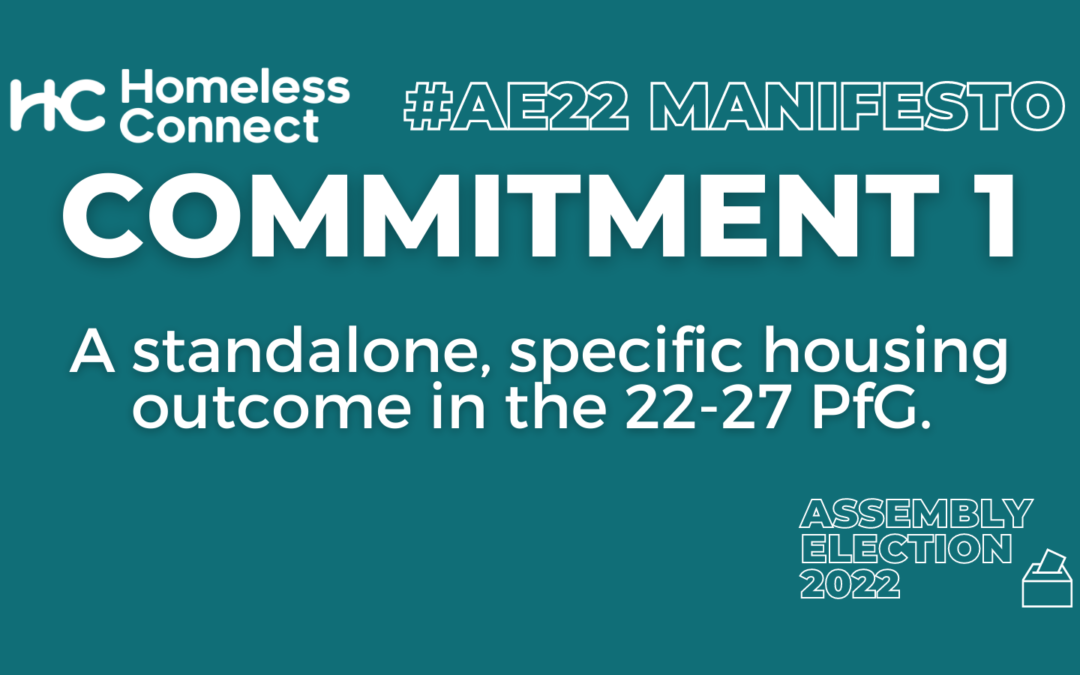In the run-up to the Assembly election coming on Thursday May 5, Homeless Connect developed a manifesto to take to political parties putting forward candidates.
We worked with our members and our policy forum to develop the manifesto. It includes ten policy proposals which, if enacted, would make a real difference in preventing and reducing homelessness here.
As polling day nears, we are going to publish a series of blogs unpacking the ten proposals and explaining why they matter.
NUMBER ONE
A standalone, specific housing outcome in the Programme for Government 2022-2027 with emphasis on the prevention and reduction of homelessness.
We are in the midst of a homelessness crisis.
Over the last three years, the number of households in temporary accommodation has increased by 74%.[i] The number of households legally recognised as homeless on the social housing waiting list continues to rise, having increased by over 4000 households between 2018/2019 to 2021/2022. 23,634 households on the social housing list of 44,405 have been found to be legally homeless.
Behind these figures are real people living with the uncertainty and anxiety of not having a place to call home. Experiencing homelessness comes with real costs.
It will not be easy to turn this situation around. If it is going to happen, we need the different arms of the state to work together towards the common goal of preventing and reducing homelessness.
In our system of Government, one of the key ways to achieve this goal is through the Programme for Government. This programme sets the agenda for the Executive as a whole and determines what will be prioritised.
The Programme includes a number of outcomes the Executive would like to achieve. In the draft Programme for Government produced in the 2017-2022 mandate, there was no specific, standalone outcome focused on housing and homelessness.
This was in spite of the fact that such an outcome was promised in the New Decade, New Approach deal which restored the devolved institutions in January 2020. Housing and homelessness issues were instead considered under a scattered range of other outcomes included in the strategy.
In our view, such an approach would not see housing and homelessness issues become a focus of the Executive as a whole. Once again, housing and homelessness issues would get lost amidst a host of other competing priorities.
If the Executive is serious about tackling the housing and homelessness crisis this society is experiencing, they need to have a clear, specific and standalone outcome with relevant indicators in the Programme for Government. This would make housing and homelessness a core issue on which the success or failure of the Executive would be measured.
While such an outcome in and of itself will not produce better results, it will help to focus minds and drive the cross-Executive working we need to see.
An obvious point to finish. For a programme for Government to be produced, we need to have an operational Executive in place. It is not our place to comment on the factors which have led to the collapse of the Executive. However, we know from our members that the fact that the Executive is not in place has damaging consequences for people experiencing homelessness and the wider sector which supports them.
We urge political parties to find solutions which will allow the Executive to return in a fully functional form.
[i] Department for Communities, Homelessness Bulletin July to December 2021, https://www.communities-ni.gov.uk/publications/northern-ireland-homelessness-bulletin-july-december-2021 10 March 2022.


